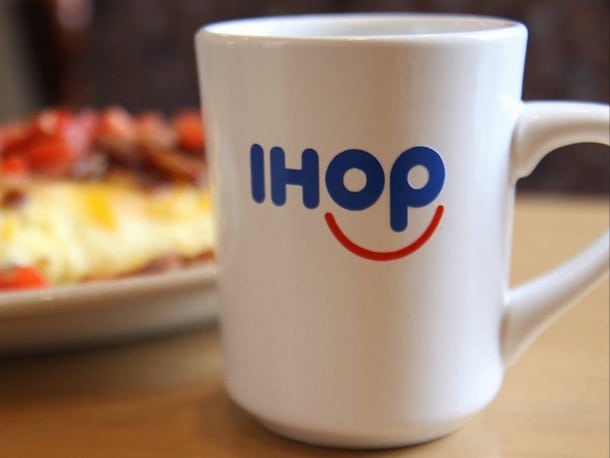
People have been saying "Nothing succeeds like success" for more than 100 years. One of its meanings holds that if something worked once, it should again. It's a staple of the entertainment industry. Avoiding innovative, untested ideas, Hollywood regularly remakes old films that were successful, hoping to attract new audiences. In television, series of the past live on as re-runs or get new productions. The practice of singers covering songs that were previously recorded is so accepted as to be unremarkable.
Similarly, we often see brands and organizations repeat past campaigns. This seems the case with International House of Pancakes. The blue-roofed restaurateur picked the slow news period of Memorial Day Weekend to send a significant tweet. Its tweet teased that IHOP is about to resurrect a campaign to change its name.
What could the P be? Find out June 3. #IHOP pic.twitter.com/fARA5GmQj1
— IHOP (@IHOP) May 27, 2019
B Roll
This next part was clever. Instead of just teasing the name change, it forced the uninitiated to learn the full story. Its May 27, 2019, tweet showed the IHOB logo changing to IHOP (see above). Confused? That's the point. IHOP figured those whose social media acumen is as flat as a pancake will want to know what they missed.
They missed that IHOP also changed its name last June , when it altered its brand identifier, in perfunctory ways, to IHOB. Raising awareness for the b was the goal. On June 11, 2018, the chain introduced burgers to its menu. Though teased as a permanent name change, IHOB was a hoax. The brand didn't change its IHOP trademark and references to IHOB lasted slightly longer than acid reflux.
Still, breaking through the clutter is a sine qua non of PR. In that sense, getting the old, reliable IHOP brand a place in the zeitgeist was a feat. Social media exploded. Ditto traditional earned media coverage, pro and con, of course. Even the PRNEWS site cranked out three articles mentioning the effort.
Return to the Well
So, IHOP figured, let's do it again a year later, or at least celebrate last year's seven days of relevance. (The initial tweet about IHOP changing to IHOB was posted June 4, 2018; the reveal occurred June 11.) Similar to last year's stunt, IHOP now says it will release details about what the P means in 7 days time, on June 3, 2019.
It's working again, so far. The tease has elicited much reaction on social and in traditional media. This time it seems a given that whatever the p represents, it will be a short-lived. Still, people are talking, and tweeting. Some are playing along, suggesting the p stands for pizza, or some sort of pizza-pancake. One Twitter user suggested we'll soon see the debut of the International House of Pretzels.
A possibility is the P stands for something to do with portability. To-go orders are exploding for the IHOP brand. They jumped 54 percent in the recent quarter and now are 10 percent of sales.
International house of Pretzels incoming
— 🍊🍩 (@lurkingtil1am) May 27, 2019
Avoiding Too Much Syrup
The name change of 2018 generated a lot of gum flapping. People spoke more about IHOP as a result of the 2018 campaign, YouGov research says. Similarly, people remembered its ads at a greater rate than before.
But were any of those gums used to chew IHOP's food? Yes. Burger sales jumped during the campaign, though YouGov says interest in visiting IHOP restaurants fell 12 percent during the month from June 4, 2018. Still, burgers are booming at IHOP. The CA-based company says its beef patties have become the most popular item for lunch and evening customers. And 2018 was a good year for IHOP. U.S. sales rose to $3.39 billion from $3.26 billion in 2017.
It's good that IHOP is active on social. It responds regularly to comments, ensuring that its presence is conversational. Similarly, the brand has shown that it listened to what was said in 2018 about IHOP becoming IHOB. As communicators know well, the harshest critics live on social media.
Last year, the Internet had a lot to say about IHOb. Well, we heard you. Stay tuned for June 3. #IHOP pic.twitter.com/ycbk0rKAY8
— IHOP (@IHOP) May 28, 2019
There's also already plenty of criticism of IHOP for resurrecting the name-change campaign. Having IHOP teasing a name change, then going back on its word, left some feeling the brand was inauthentic.
Here's hoping IHOP listened in 2018. If the brand did, the 2019 campaign should not end like the boy who cried wolf, and instead prove to be a case of success breeding success.
Could it be "Publicity stunt"?
— Tom (@Elder_Cincy_Guy) May 27, 2019
Seth Arenstein is editor of PRNEWS. Follow him: @skarenstein
